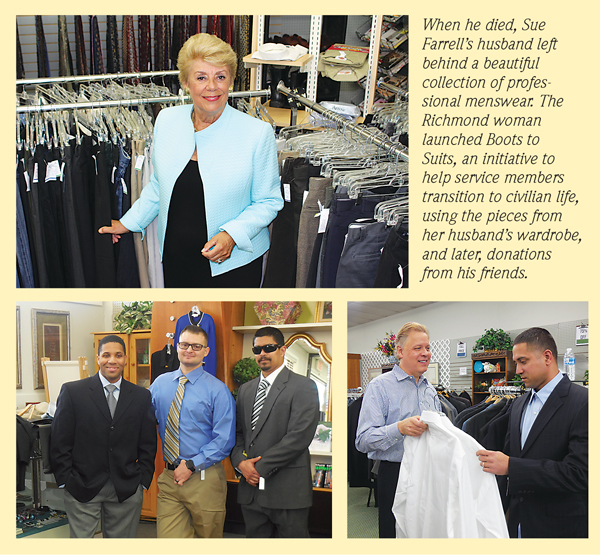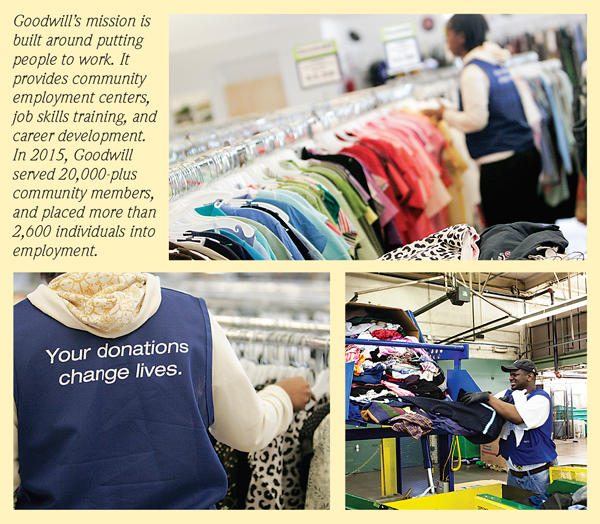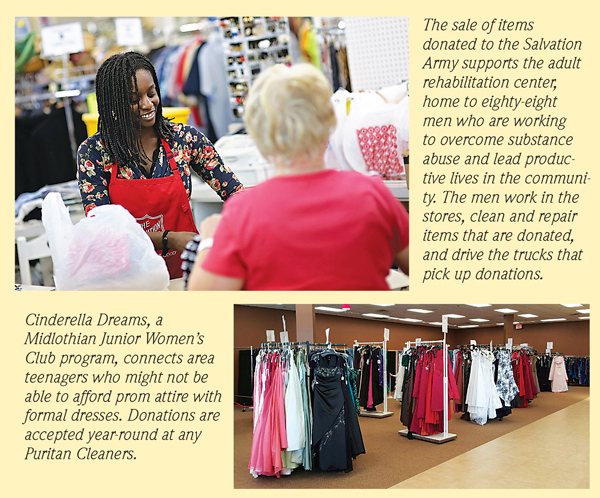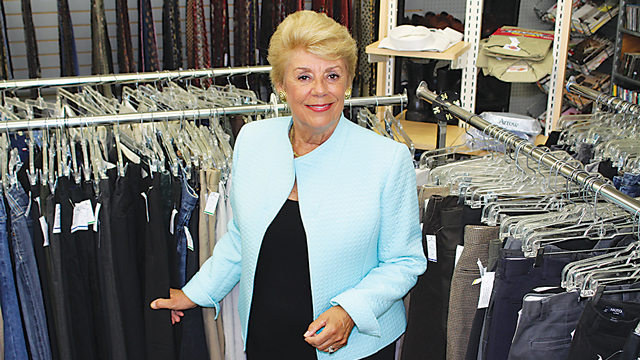It took Sue Farrell a while after the death of her husband, Joe, in 2013 to feel like she could give his clothes away. It was important that his belongings go to someone or some place special. Finding the right organization to receive that kind of donation, and knowing where those items will end up, can take time and effort. Not all organizations have the same transparency.
Sue Farrell took her search to another level by founding Boots to Suits, a Junior League of Richmond clothing voucher program for men and women that assists veterans transitioning from military life to a new career. Her late husband was a naval officer serving as Lieutenant Commander of the U.S.S. Pollock. “After serving in the military, he went into corporate life,” Farrell says, noting that he retired from The Pittston Company. “During Joe’s corporate life, he and his company supported veterans’ programs.”
Farrell had read articles about how a government agency was helping service members move into civilian careers. “There are over 800,000 veterans in the U.S. and many have mental or physical issues,” she says, noting that it was her goal to collect professional clothing to make the career transition easier for some of these veterans.
A former member of the Junior League of Richmond, Farrell received the green light from the organization to launch a program for veterans entering the professional world.
The original Boots to Suits inventory consisted of the custom tailored suits, ties, and casual clothing from her husband’s closet at home. Each item had its own memory attached to it. “It was emotional for me to give his clothes away,” Farrell says.
 Her reaction is not uncommon for someone who has lost a loved one to tragedy or death, says Henrico County-based licensed marriage and family therapist, Margaret Norman. “The person often sees their belongings as representative of their loved one. They are not just sentimental. The person can identify the item with their loved one, and they want to honor them.”
Her reaction is not uncommon for someone who has lost a loved one to tragedy or death, says Henrico County-based licensed marriage and family therapist, Margaret Norman. “The person often sees their belongings as representative of their loved one. They are not just sentimental. The person can identify the item with their loved one, and they want to honor them.”
Farrell went to her husband’s friends and asked for any clothing they weren’t using. “My husband’s contacts were very broad,” she says. “In ten days, I had 600 suits and all the accessories to go with them.”
So far the program has helped more than 225 veteran families get the clothing and accessories they need to pursue their careers. Here’s how it works: Veterans with a voucher issued by the Virginia Transition Assistance Program, part of the Virginia Department of Veterans Services, can make an appointment at either the Cary Street or Stratford Hills location of The Clothes Rack where Boots to Suits is housed, and the proper clothing and sizes will be pulled for them.
“It’s very, very gratifying to see these guys come in shuffling with their heads down, and when they leave two hours later they are beaming. They all have suit bags and dress bags filled with clothes that make them look sharp as a tack,” Farrell says. “It’s heartwarming and thrilling to see the transformation in their personality.”
 The program has been a great success, she adds, noting that it accepts donations of business suiting and casual attire for both men and women at either Clothes Rack location. “We are proud of the donors. Many widows have found the program.”
The program has been a great success, she adds, noting that it accepts donations of business suiting and casual attire for both men and women at either Clothes Rack location. “We are proud of the donors. Many widows have found the program.”
The Clothes Rack is the Junior League of Richmond’s biggest fundraiser. “It’s been open over sixty-five years,” says the League’s president Joanne Frye. “We are the only Junior League in the nation to have two resale stores.”
Monies generated by sales at the stores go to meet the organization’s mission to improve the community. “Our focus is working with the East End community of Richmond,” Frye says, noting that the organization’s community outreach programs include Families First, Literacy Through Art Outreach, Good Sports, and Kids in the Kitchen.
Boots to Suits and The Junior League of Richmond are just two of several options for people who want to donate their items to an organization with a mission. Kristi Smith, treasurer and chair of this year’s Cinderella Dreams Project for Midlothian Junior Women’s Club, is always on the lookout for the donation of prom dresses.
Now in its eleventh year, Cinderella Dreams provides prom dresses and accessories to girls who might not have the means to purchase attire for a prom. The organization holds an annual event during the first or second week of March where girls can come and shop for a prom gown. A modest donation serves as an admission of sorts. The teens leave with what sometimes amounts to the dress of their dreams. “We do it two weekends in a row,” Smith says. “We have had parents bring their daughters all the way from Northern Virginia and Virginia Beach. We serve anybody who comes to the event who has a need. We focus mostly on Chesterfield, Powhatan, Midlothian, Dinwiddie, Nottoway, and Amelia. We also get girls from the City of Richmond.”
This year, about 500 girls came to the retail space at Westchester Commons to hunt for a dress. “We need a lot of dresses,” Smith says, adding that donations of prom dresses are accepted year-round at any location of Puritan Cleaners. Currently, the organization is in need of dresses size eighteen and up.
“We started with over 1,800 dresses this year,” Smith says. “Some of those dresses have been around for several years, and we donated some to another women’s club that was doing something similar. We kept about 700 dresses for next year.”
Once the annual Cinderella Dreams event is over, the volunteers from the group take some of the dresses not deemed prom-style and donates them to The Clothes Rack and Dress for Success, an organization that provides attire for women attempting to move into professional fields and in need of the proper clothing for interviews. “We work with them quite a bit,” Smith says.
 Eighty percent of the high school-aged teens who come to the shopping event are from families in financial need. “We have about 20 percent of kids who would probably still have a prom dress, but it’s nice to provide it, so they don’t have to worry about using discretionary money to buy a dress,” Smith says.
Eighty percent of the high school-aged teens who come to the shopping event are from families in financial need. “We have about 20 percent of kids who would probably still have a prom dress, but it’s nice to provide it, so they don’t have to worry about using discretionary money to buy a dress,” Smith says.
When it comes to donating a variety of items – everything from clothing to household goods – Goodwill is one of the first organizations that comes to mind. Seventy-five percent of items donated by families are sold in Goodwill stores. In the Richmond area, the organization has thirteen attended donation sites and sixteen stores, as well as unattended boxes at landfills where people can place donated items.
“We get donations all year long. Saturdays are good days for us,” says Derby Brackett, vice president of marketing and communications for Goodwill of Central and Coastal Virginia. “We have a generous customer base. We try to process donations in the store you give to.”
Items that don’t sell are pulled from the stores and sent to the organization’s outlet where they are sold by the pound. “If they don’t sell at the outlet, they go to salvage,” Brackett says. “We work with salvage dealers. The whole purpose is to keep clothing out of landfills. We have kept 37 million pounds of donated goods out of the landfill.”
Goodwill’s mission is built around putting people to work. It provides community employment centers, job skills training, and career development. In 2015, it served 20,000-plus community members, and placed more than 2,600 individuals into competitive employment. “That is what we are here for,” Brackett says. “Ultimately our goal is to place people in sustainable employment. We think everybody should have a purpose and a chance to reach their vision.”
Donations are not only a great bargain for shoppers, but they also serve a greater purpose. “Folks who donate to Goodwill know that somebody is getting a belonging that means something to someone else, and they know that they are donating to our mission,” Brackett says.
The organization receives all kinds of interesting donations. “We have gotten diamond rings and estate jewelry,” Brackett says. “We will pull that separately and do research to price it accordingly. We put things out every day. That is the magic behind the stores. We want all of our stores to be a treasure hunt for someone.”
The Salvation Army Central Virginia is another trusted source for donations. All of the donations made to the organization are taken to the Salvation Army Adult Rehab Center Family Store at 2601 Hermitage Road. It is one of the organization’s three stores; the other two are located on Midlothian Turnpike and Mechanicsville Turnpike. The Salvation Army also has dropboxes, largely in Kroger parking lots, and will pick up items by scheduling a pickup through 1-800-SA-TRUCK (1-800-728-7825).
The organization accepts a variety of donations, everything from clothing and shoes to furniture and appliances. “This is very much a business of selling items to an audience searching for those items,” says Matt Pochily, communications director, Salvation Army Central Virginia.
The sale of these items support the adult rehabilitation center, home to eighty-eight men who are working to overcome substance abuse and lead productive lives in the community. The men work in the stores, clean and repair items that are donated, and drive the trucks that pick up donations. Funds generated through the stores go to support the Salvation Army’s mission of making a difference in the lives of the people it serves.
Some organizations vying for your donations via parking lot drop boxes or mailers make it virtually impossible to find out where your donations end up. They could benefit a worthy cause or the items you donate may be sold or recycled for profit. Organizations that take in donations include Ohio Mills, www.helpvets.com and Green Drop, which has a location in Richmond, and says on its website that it converts lightly used clothing and household items into critical funds for great American charities. You’ll also find boxes for Planet Aid, which states on its website that it recycles and also sells clothing to domestic buyers or overseas customers. According to its website, a portion of that good-quality clothing goes to domestic thrift stores, but the large majority gets sold to overseas customers.
Ultimately, if you’re emotionally invested in the items you are giving away, like Sue Farrell of Boots to Suits, or classify yourself as a conscientious consumer, you may want to do your research before donating to an organization that is unfamiliar to you. “Be sure and do your homework,” says Brackett of Goodwill.




